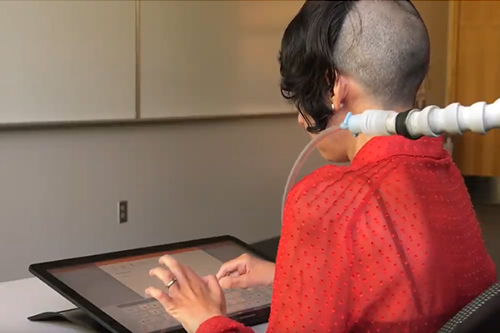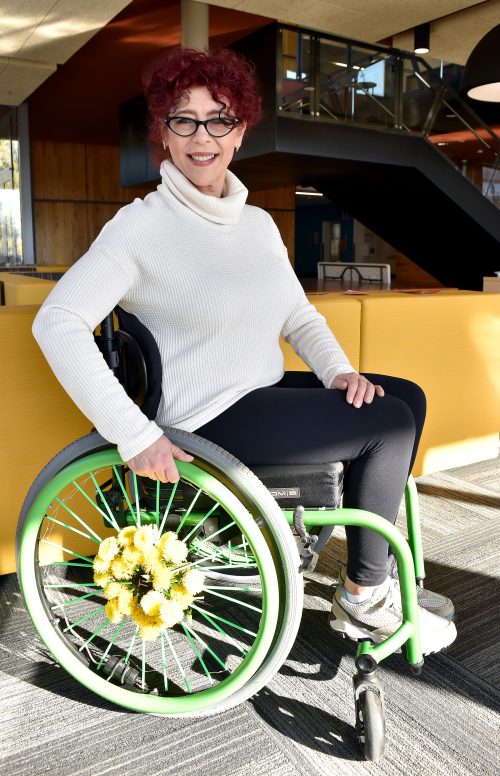This content was published: May 16, 2022. Phone numbers, email addresses, and other information may have changed.
PCC’s first comprehensive ADA transition plan addresses barriers affecting students
Story by Sarah Rose Evans. Photos by Wendy Wright.
Portland Community College is committed to making education more accessible for everyone in our community. This effort is partially led by students themselves. A group of students known as ‘Disability Advocates’ are providing leadership and key feedback for the college’s first-ever Comprehensive ADA Transition Plan, part of the college’s Strategic Plan.
PJ Golden, an advocate and second year student at PCC, is passionate about creating an inclusive culture that honors people with disabilities for all the talent they bring to the table.
“What’s great about PCC is that they want to do better,” Golden said. “They’re not afraid of saying, ‘Let’s find new, innovative ways to address these issues.’”
The disability advocates’ work includes establishing Delta Alpha Pi, an international honor society that recognizes the achievements of college students with disabilities. To help fund 05memberships for students, Golden has spearheaded the first-ever Accessibility First Job Fair, happening May 2022. Thirty area employers will be there to share why their companies are welcoming places for people with disabilities.
Golden is also excited about working with her fellow advocates to provide critical feedback on the ADA Transition Plan.
The ADA Transition Plan is a big-picture approach that identifies barriers to full participation at the college. These barriers might be in built or digital environments, in academics, or embedded in culture. Once identified, the plan recommends modifications to increase access.
“Thankfully, I have found a supportive environment here at PCC, but there is still a lot more work that can be done on eradicating ableism,” said Golden.
Jennifer Gossett, PCC’s newly hired ADA/504 Compliance Manager, will lead this work. Gossett is returning to PCC after leading Oregon Health and Science University’s Office for Student Access for the past five years. “I am excited to continue the work that has been started by such passionate and talented students, staff, and faculty. My goal for the ADA Transition Plan is a truly inclusive process that is built by the PCC community for the PCC community.”
“A lot of people think about the student accommodation process when they think about disability in higher education, but it’s not just about reasonable accommodation,” Kaela Parks, PCC’s Director of Disability Services, explained.

Creating Access
PCC’s Disability Services recognizes disability as a valued aspect of diversity and embraces access as a matter of social justice, and to promote universal design and inclusive environments. Want to help? Check out the committees you can join to assist in creating change.
“When people hit snags, they get sent to Disability Services. An accommodation is an adjustment within an individual course for a student. Then you’re redoing that work every time another student hits that same barrier,” Parks said. “If we think about it from a larger systems approach, we can smooth out the snags.”
Sydney Smalley, a member of the disability advocate team, understands the importance of applying lessons learned through Disability Services at scale. “At first I thought moving from an in-person classroom to fully online would be a difficult task. But online accessible courses have helped me with my learning disability. Addressing these barriers and finding practical ways to eliminate them has made me feel like I have an equal opportunity to succeed at PCC.”
“It’s a more justice-oriented approach,” Parks added. Parks will be supporting the ADA Transition Plan project with Equity Investigator Theresa Payne from the Office of Equity and Inclusion.
“It is exciting work because this plan will impact so many people and it will do so for decades,” Payne said. “It’ll be a living document, which will be updated over time as conditions evolve.”
Otto Norton, another disability advocate, chimed in, “It helps students when we normalize access needs. I’ve done a lot of outreach with other students. I’ve noticed people need a lot of coaxing to ask for or accept help. The more we advocate around access needs, the more students will know those are things they can get help with.”
“PCC isn’t alone in needing to do this work,” Golden said. “But we can model a better future, for others as well as for ourselves. The exciting thing about PCC is that we don’t do the status quo. We’re always thinking, researching, and moving towards justice.”

